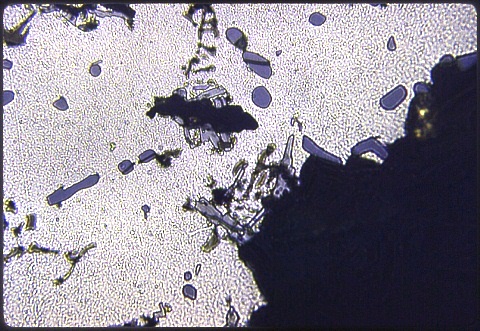
What modifications to microstructure and properties have been accomplished ?
The pair of photomicrographs at left have the same 100X and 500X magnifications as in Specimen 6.

The heat treatment produced a modest gain in toughness of the casting.
 |
This piece was from the same casting as the preceding
specimen, but after a heat treatment of forty hours at 505C.
It has been deliberately fractured this time. What modifications to microstructure and properties have been accomplished ? The pair of photomicrographs at left have the same 100X and 500X magnifications as in Specimen 6. |
 |
The CuAl2 phase has been spheroidized, and the Chinese
script has darkened. The fracture path, which goes across the
bottom of the photomicrographs, is across the dendrites now, but it
still follows the brittle phases and the shrinkage pores. The heat treatment produced a modest gain in toughness of the casting. |
| Concluding
statement: This series of specimens included only cast aluminum alloys,
mainly because the microstructures of wrought aluminum alloys are
rather dull when viewed with a light microscope; in fact, the
microstructures of age hardened aluminum alloys are generally
unresolvable with the light microscope. That does not mean that
wrought, heat treated aluminum is uninteresting or unimportant, but
only that I have not accumulated a representative collection of
suitable electron micrographs of such
specimens.
|